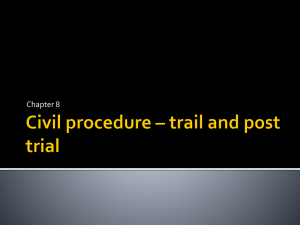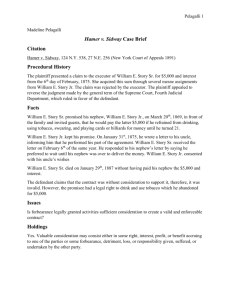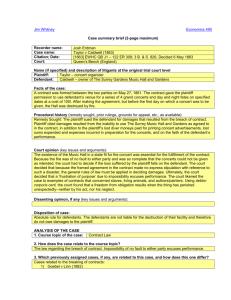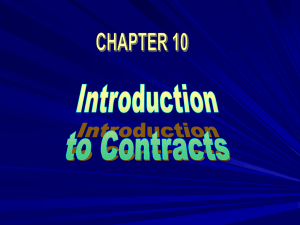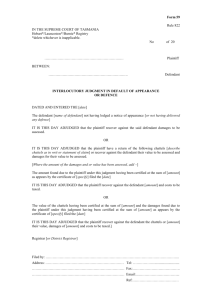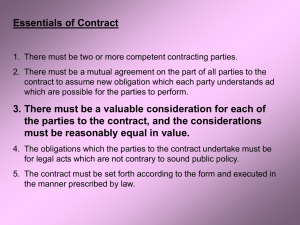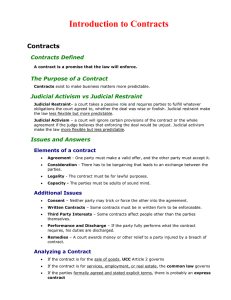Contracts I – Maggs -Fall 2011 Attack Sheet
advertisement
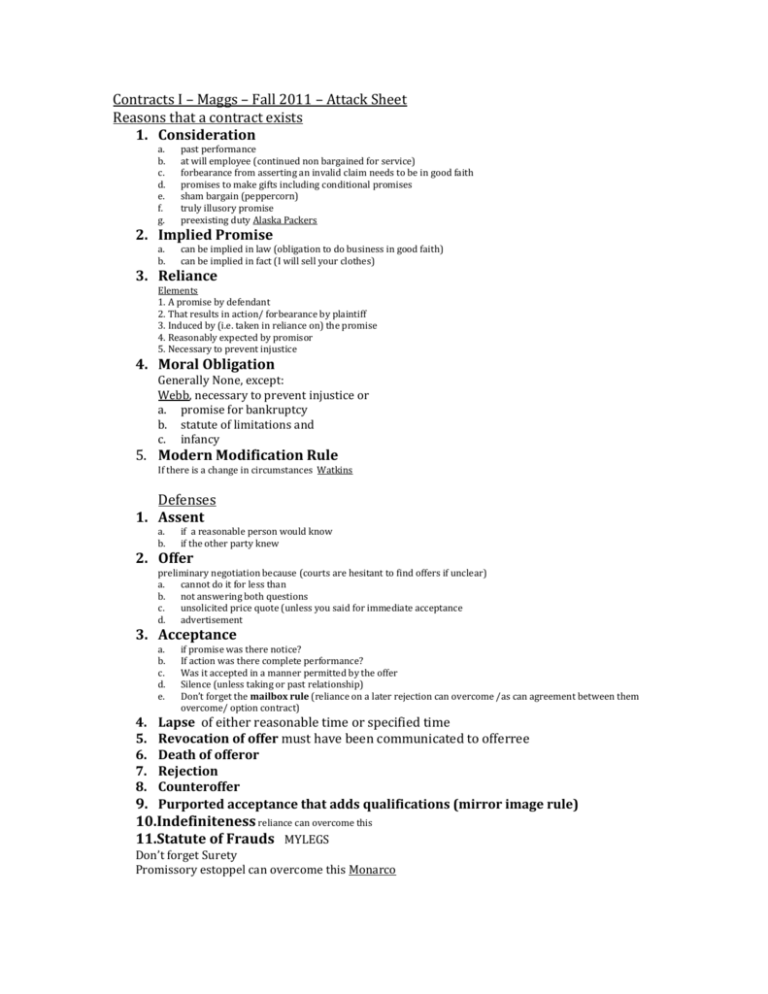
Contracts I – Maggs – Fall 2011 – Attack Sheet Reasons that a contract exists 1. Consideration a. b. c. d. e. f. g. past performance at will employee (continued non bargained for service) forbearance from asserting an invalid claim needs to be in good faith promises to make gifts including conditional promises sham bargain (peppercorn) truly illusory promise preexisting duty Alaska Packers 2. Implied Promise a. b. can be implied in law (obligation to do business in good faith) can be implied in fact (I will sell your clothes) 3. Reliance Elements 1. A promise by defendant 2. That results in action/ forbearance by plaintiff 3. Induced by (i.e. taken in reliance on) the promise 4. Reasonably expected by promisor 5. Necessary to prevent injustice 4. Moral Obligation Generally None, except: Webb, necessary to prevent injustice or a. promise for bankruptcy b. statute of limitations and c. infancy 5. Modern Modification Rule If there is a change in circumstances Watkins Defenses 1. Assent a. b. if a reasonable person would know if the other party knew 2. Offer preliminary negotiation because (courts are hesitant to find offers if unclear) a. cannot do it for less than b. not answering both questions c. unsolicited price quote (unless you said for immediate acceptance d. advertisement 3. Acceptance a. b. c. d. e. 4. 5. 6. 7. 8. if promise was there notice? If action was there complete performance? Was it accepted in a manner permitted by the offer Silence (unless taking or past relationship) Don’t forget the mailbox rule (reliance on a later rejection can overcome /as can agreement between them overcome/ option contract) Lapse of either reasonable time or specified time Revocation of offer must have been communicated to offerree Death of offeror Rejection Counteroffer 9. Purported acceptance that adds qualifications (mirror image rule) 10.Indefiniteness reliance can overcome this 11.Statute of Frauds MYLEGS Don’t forget Surety Promissory estoppel can overcome this Monarco External Reasons to void a contract Infancy Must be restitution if emancipated for necessary items Mental Infirmity This can be either not understanding Or not acting in a reasonable manner in relation to Duress a. b. c. needs to be an improper threat like crime or tort that leaves no reasonable alternative or breach of duty and good faith needing money is not duress Fraud Plaintiff will argue material fraudulent misrepresentation based on active concealement or half truths Defendant will argue bare non disclosure, this will not work if in special relationship Or defendant will argue that it was just opinon/puffing Mistake Plaintiff will say that it was a material mistake of fact Defendant will say that it was an incorrect prediction If it is unilateral it must get to higher level of unconscionable Sometimes the court will say that a party must bear the mistake if it is reasonable for that side to Strict Construction this goes against the drafter contract Adequate Notice Public Policy a. b. c. d. promise to commit a tort not to get married courts can make new categories Busch we also had the Ocallagan and Hennigsen cases of someon being in a financially better position Unconscionability Usually for exculpation from negligence Damages a. Specific Performance 1. 2. not allowed if damages are adequate and not allowed if it was unfair a. Expectation Loss in value and other costs minus costs avoided and other loss avoided b. c. d. e. Reliance Restitution Nominal Liquidated 1. Defendant does not have to pay if it is a penalty this is determined by whether it is fair in relation to actual or anticipated loss and whether there is difficulty of proof that is a good reason to have liquidated damages 2. If plaintiff wants to get out then it has to be unconscionable Limits to damages 1. Avoidability There is constructive labor unless there is a reasonable alternative available Parker v. Fox 2. Uncertainty 3. Unforeseeability If the damages was deficient or incomplete performance 1. Loss in value to plaintiff This is difficult to prove with certainty 2. Loss in market value 3. Cost to complete This cannot be disproportionate to value to plaintiff Jacob & Young, John Wunder disagrees

